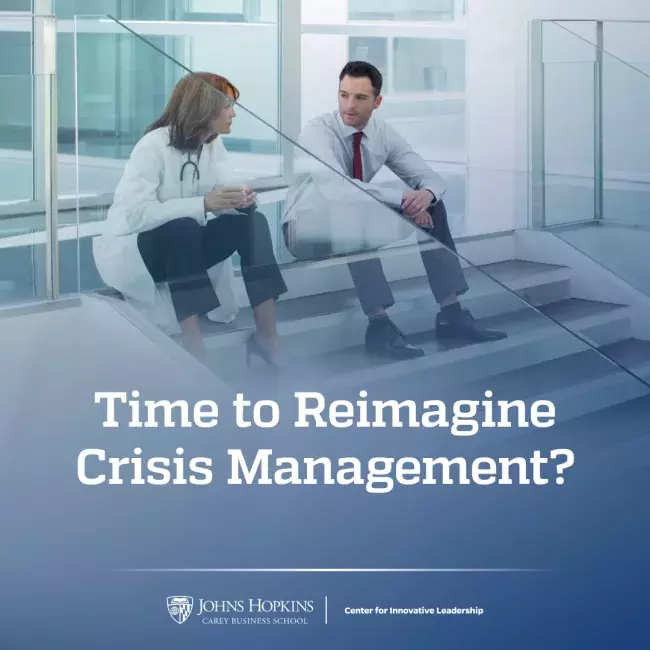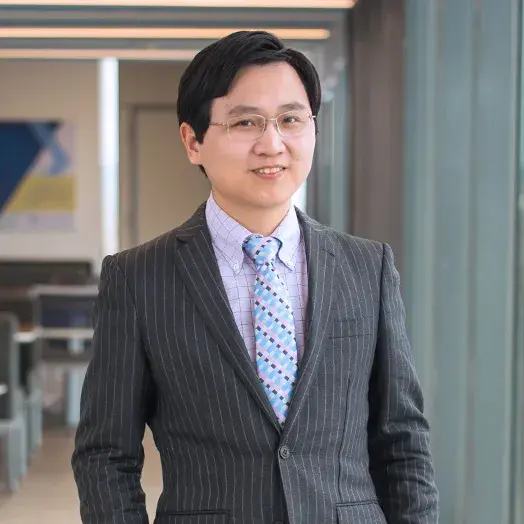Analysis of the South Korean healthcare system’s response during the COVID-19 pandemic calls for a reimagination of crisis management as a creative process—with dynamic negotiation and improvisation enabling rapid improvement of response capabilities, bringing a system to the ‘at the edge of chaos.’

Crisis Management Reimagined: Creativity at the edge of chaos
Summary
Crisis management research typically focuses on how systems respond to sudden individual crisis events hitting an otherwise stable environment such as rebuilding in a disaster-stricken region, or a cyber-attack. In these cases, successful management is achieved by restricting escalation and quickly restoring the pre-crisis equilibrium. A new study analyzes the South Korean healthcare system’s response during the COVID-19 pandemic, when equilibrium was a distant dream and it was beset by a series of cascading crises, with no clear end in sight. The way the system constantly reorganized to adapt to the changing environment offers valuable lessons in crisis management, including the discovery of a new process the authors call, ’negotiated enactment,’ whereby understandings of the crises were deepened and shared, even as they unfolded, leading to more adaptive response capabilities.
The World Health Organization declared the COVID-19 outbreak a public health emergency of international concern and began referring to it as a pandemic on 11 March 2020. But around this time, public health officials in South Korea declared that their local outbreak was now under control. How did this contrast happen?
Prior to the pandemic, crisis management research largely emphasized resilience, containment, and restoring the status quo. For the Korean public health system, and health systems around the world in 2020, there was no option to resiliently maintain the system, by containing deviations and hoping to restore normal functioning and structure. Conditions were fast-evolving, mutating in unpredictable ways, and very far from equilibrium.
Cascading crises
Under such conditions, crisis manifests not as a single traumatic event in time, in an otherwise stable environment, but as a cascading series of mini crises, creating a hyper-turbulent environment, where returning to a pre-crisis status quo is not only not possible, but likely undesirable under the changed new circumstances.
What is required is not rapid restoration but swift reorganization to adapt to the changing environment. To respond successfully, the system must have the capacity to continually adapt as the conditions change. While previous research into crises and complex social systems has focused on rapid restoration, little is known about the processes involved in swift dynamic reorganization. The purpose of this study by Suntae Kim, Johns Hopkins Carey Business School professor and Core Faculty member of the Center for Innovative Leadership, was to explore how complex social systems achieve ongoing adaptation in far-from-equilibrium conditions.
Negotiated Enactment
The central findings from the study call for a reimagination of crisis management as a creative process, based on collaboration and cooperation. Contrary to conventional wisdom—which tells us that to effectively rein in crises requires strong leadership and compliant followership—rapid adaptation to fast-evolving crises may in fact require followers who deviate vocally, and leaders who can coordinate them heedfully.
We may also deduce that the popular notion that individualistic democratic societies are ill-suited for crisis response, is false. The Korean experience suggests a fully functioning democracy, marked by constant negotiations and compromises, is essential for a society’s swift transformation to face far-from-equilibrium conditions.
To describe this new approach to the management of cascading crises, the authors coin the phrase, ‘negotiated enactment,’—a process whereby actors in the system are enabled to take improvisational but coordinated action, based on shared assessments of the situation. Innovative actions emerge from heedful negotiations among these actors—in this case medical experts, local government officials, hospital staff, and members of the general public—at the height of the crisis. As the process continues, the system moves out from the rigid confines of preexisting order, but crucially avoids falling into chaos—instead dynamically staying at the edge of chaos—in a state where, according to previous research, complex systems exhibit the most adaptive behaviors.
Creativity at the edge of chaos
Whereas the focus of crisis management research has been on suppressing and quickly correcting risky deviations in the system, in fact, when facing far-from-equilibrium conditions, complex social systems can benefit from letting deviations play out, and heedfully harnessing their adaptive potential. Furthermore, the traditional emphasis on resilience, in the sense of the system ‘bouncing back’ to its pre-crisis state, may be misplaced. The system should focus on ‘bouncing forward’ to a new adaptive state. Crisis management should be viewed as a creative process, where complex interactions among actors can generate previously unthinkable responses to align with previously unimaginable circumstances.
Crisis leadership and democracy
The conventional wisdom tells us that we need strong and decisive leadership in moments of crisis. Even the leading leadership scholars like Linda Hill, who endorses 'leading from behind,' argues that in times of crisis, leaders should lead from the front. This study puts this conventional wisdom into a serious question: it argues that leadership, in a time of crisis like the COVID-19 pandemic, needs to be focused on coordination rather than control—coordinating actors across the system to facilitate negotiated enactment and using feedback from the environment to learn and adapt. It is no use enforcing existing guidelines that are likely to turn out to be inadequate to address the new crisis. Successful crisis management does not come from strong and infallible leadership, but results from leaders actively listening to and willingly engaging with those at the forefront of the struggle against the crisis.
In South Korea, the arena for negotiation evolved as ordinary citizens actively deviated from the government’s directives and those in leadership roles attentively engaged with the dissenting voices on the ground. This had the positive side-effect that participating in negotiations empowers actors on the ground and enhances their sense of agency, which can later lead to greater compliance.
Listening and collaborating is key, and these observations back-up the assertion that, among all known political systems, democracy may be the one best suited to facilitating a society’s complex adaptation. The idea that democratic societies are more vulnerable to epidemics because their citizens do not obediently comply with restrictions on individual freedom may only be a half-truth. The other critical truth is that when democracy operates in its full sense, in the face of an unfolding crisis, it can unleash the complex process of creatively figuring out how to collectively deal with the crisis, thereby minimizing inevitable restrictions on individual freedoms and keeping a delicate balance among conflicting interests in the society. Democratic processes, which to some may seem messy and disorderly, should be celebrated rather than restricted in a time of crisis—while dissent should be embraced rather than criticized, and compromising seen as a sign of strength rather than weakness.
This CIL Research Brief highlights research-in-progress by Center faculty. For the complete research paper, please contact Prof. Suntae Kim (Johns Hopkins University).
The Center for Innovative Leadership (CIL) at the Carey Business School aims to advance knowledge and build capacity for innovative leadership in modern organizations. CIL is a hub for new ideas and insights on leadership, combining faculty-led research, student-facing programming, and community-focused impact.


